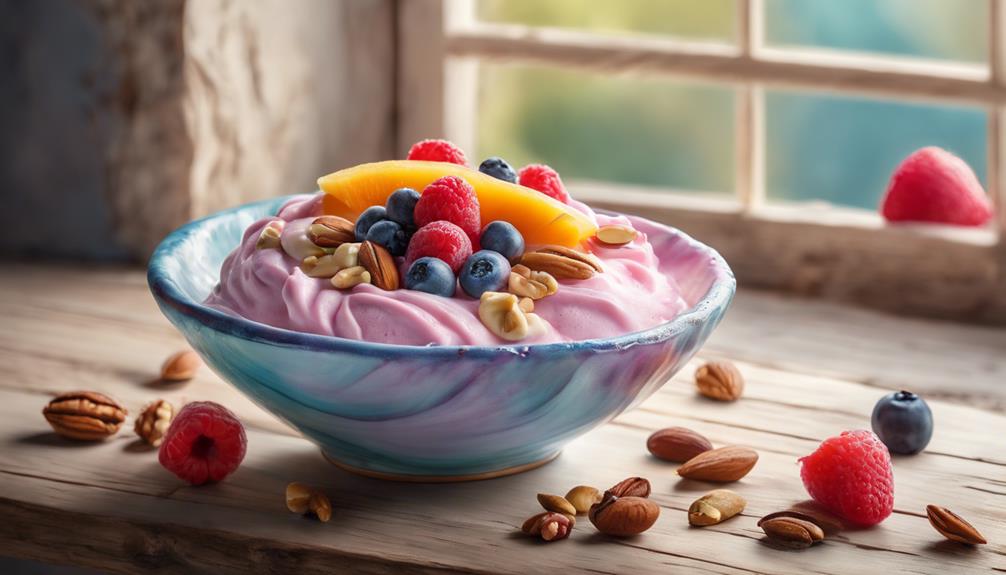Frozen yogurt is often celebrated for its invigorating taste, but its benefits extend far beyond mere culinary delight, particularly when it comes to skin health. The probiotics present in frozen yogurt, such as Lactobacillus and Bifidobacterium strains, play an essential role in maintaining the skin's microbiome, which is vital for a strong skin barrier and reduced inflammation. This can lead to less redness and irritation, fostering a clearer, more radiant complexion. However, the potential of frozen yogurt in skincare is not limited to its probiotic properties; its lactic acid content and hydrating qualities also offer unique advantages that warrant closer examination.
Key Takeaways
- Frozen yogurt contains lactic acid, which gently exfoliates and promotes skin renewal.
- Probiotics in frozen yogurt support the skin's barrier function and reduce inflammation.
- Lactobacillus and Bifidobacterium strains in frozen yogurt fortify the skin's microbiome.
- Natural fats and proteins in frozen yogurt hydrate and nourish the skin.
- Frozen yogurt's antimicrobial properties can help reduce acne and improve skin clarity.
Lactic Acid Benefits

Lactic acid, frequently utilized in dermatological treatments, is an alpha-hydroxy acid that provides significant benefits for skin moisturization, exfoliation, and barrier support. Naturally present in yogurt, lactic acid comprises approximately 0.9%, whereas commercial skincare formulations may contain up to 5%. This organic compound plays a pivotal role in skincare regimens due to its ability to gently exfoliate the stratum corneum, promoting cellular turnover and revealing a more radiant complexion.
The utilization of yogurt in skincare is particularly advantageous. Not only does lactic acid in yogurt aid in exfoliation, but it also enhances skin hydration by reinforcing the lipid barrier. This dual action of exfoliation and moisturization helps in maintaining the best skin health. Additionally, yogurt is rich in probiotics, which contribute to skin microbiome balance, potentially reducing inflammation and improving overall skin resilience.
Additionally, yogurt possesses inherent antimicrobial properties, making it an effective adjunct in managing acne-prone skin. The combination of lactic acid and probiotics in yogurt can help calm inflamed skin and inhibit the proliferation of acne-causing bacteria. Incorporating yogurt-based masks into a skincare routine can offer a multifaceted approach to achieving and maintaining healthy skin.
Hydration and Nourishment
Yogurt and kefir, rich in natural fats and proteins, provide essential hydration and nourishment to the skin, enhancing its overall health and resilience. These fermented products are notable for their multifunctional skincare benefits, primarily due to their hydration and nourishment properties. The natural fats help to lock in moisture, preventing trans-epidermal water loss, while proteins aid in skin repair and regeneration, important for maintaining skin integrity.
Lactic acid, a component found in both yogurt and kefir, acts as a gentle exfoliant, promoting skin renewal by removing dead skin cells. This not only enhances hydration but also improves the skin's texture and appearance. Additionally, the antimicrobial properties inherent in these dairy products can mitigate acne, contributing to a clearer complexion.
The incorporation of probiotics supports the skin's natural barrier, aiding in hydration and nourishment. This holistic approach to skincare can be further customized by adding essential oils to homemade masks, optimizing specific skincare benefits.
| Component | Skincare Benefit |
|---|---|
| Natural Fats | Hydration, moisture retention |
| Proteins | Nourishment, skin repair |
| Lactic Acid | Gentle exfoliant, promotes skin renewal |
| Antimicrobial | Acne reduction, clearer skin |
| Probiotics | Supports skin barrier, reduces inflammation |
Probiotics for Skin

Probiotics found in frozen yogurt offer substantial benefits for skin health by enhancing the skin's natural barrier function and mitigating inflammatory skin conditions. These live microorganisms, particularly strains from the Lactobacillus and Bifidobacterium genera, are known to fortify the skin's microbiome. By bolstering the skin's barrier, probiotics help to maintain hydration, protect against environmental aggressors, and reduce trans-epidermal water loss, contributing to overall healthy skin.
Scientific evidence suggests that regular consumption of probiotic-rich frozen yogurt can effectively manage acne and promote clearer skin. Probiotics exert anti-inflammatory properties that can alleviate symptoms associated with acne, such as redness and swelling. Additionally, by modulating the immune response, probiotics may reduce the occurrence of other skin conditions, such as eczema and rosacea.
Furthermore, the ingestion of frozen yogurt containing live cultures can improve the gut-skin axis, a bidirectional pathway linking intestinal health with skin health. A balanced gut microbiome can influence systemic inflammation levels, subsequently reflecting on skin condition and appearance. Incorporating frozen yogurt into one's diet not only supports digestive health but also offers a promising adjunctive strategy for achieving clearer and healthier skin.
DIY Yogurt Masks
Incorporating DIY yogurt masks into skincare routines can deliver multifaceted benefits, primarily due to the lactic acid content which provides gentle exfoliation and enhances skin radiance. The lactic acid in yogurt efficiently exfoliates dead skin cells, promoting a brighter and more even complexion. The presence of probiotics in yogurt supports the skin's natural barrier, aiding in the mitigation of inflammation and fostering an environment conducive to healthy skin microbiota.
DIY yogurt masks offer the advantage of customization to address various skin concerns. For instance, integrating honey into the mask can enhance its moisturizing properties due to honey's natural humectant characteristics. Honey also possesses antimicrobial properties, making it beneficial for acne-prone skin. Adding oats can contribute to the mask's soothing and anti-inflammatory effects, ideal for sensitive or irritated skin.
Furthermore, homemade yogurt masks can be tailored using yogurt or kefir, which may provide additional antimicrobial benefits. This customization not only augments the mask's efficacy but also allows individuals to cater to their specific skin needs, maximizing the therapeutic potential of the ingredients. Therefore, DIY yogurt masks serve as a versatile and effective component of a well-rounded skincare regimen.
Tips and Precautions

When utilizing yogurt or kefir masks, it is important to conduct a patch test to make sure there are no adverse skin reactions. This initial step is vital given the presence of lactic acid, which functions as a chemical exfoliant. While this property can remove dead skin cells and promote a smoother complexion, it can also cause irritation in sensitive individuals.
In addition, the probiotics inherent in frozen yogurt and kefir contribute to enhancing skin health by supporting the skin's natural barrier and reducing inflammation. However, individuals with compromised skin barriers should proceed with caution to avoid potential exacerbation of existing conditions.
The natural fats and proteins present in these dairy products provide significant moisturizing benefits, which can aid in maintaining skin hydration. Nevertheless, those with oily or acne-prone skin should be aware that excessive moisturizing could potentially lead to breakouts.
Moreover, the antimicrobial properties of yogurt and kefir masks may offer advantages for acne-prone skin by targeting bacteria. It is advisable to limit the application to no more than twice a week to avoid over-exfoliation or disruption of the skin's microbiome.
Frequently Asked Questions
What Does Frozen Yogurt Do to Your Body?
Frozen yogurt can regulate blood sugar, enhance digestive health, aid calcium absorption, and support weight management. It benefits those with lactose intolerance, boosts immune support, and increases protein intake, contributing to overall well-being.
Does Eating Yogurt Improve Skin?
Ironically, the answer to radiant skin might be found in your fridge. Consuming yogurt offers probiotic benefits, enhancing skin hydration, nutrient absorption, gut health, antioxidant effects, and collagen production, all crucial for maintaining excellent skin health.
Is Frozen Yogurt Still Probiotic?
Yes, frozen yogurt can still be probiotic. The presence of live cultures from cultured bacteria, preserved through the fermentation process, contributes to lactose digestion, gut flora balance, probiotic benefits, and overall digestive health.
Is Frozen Yogurt Actually Healthier Than Ice Cream?
Despite concerns about higher sugar content, frozen yogurt is generally healthier than ice cream due to lower calorie counts, fat reduction, and benefits for lactose intolerance. Evaluating nutritional labels and practicing portion control are crucial for making the best choices.
Conclusion
To sum up, the incorporation of frozen yogurt into skincare routines presents a multifaceted approach to enhancing skin health. By harnessing the probiotic properties of Lactobacillus and Bifidobacterium strains, frozen yogurt fortifies the skin's microbiome, mitigates inflammation, and promotes a balanced complexion. The lactic acid content further contributes to skin hydration and nourishment, making it a potent ally in skincare. Ultimately, frozen yogurt emerges as a holistic and scientifically-supported avenue for achieving resilient and radiant skin.







